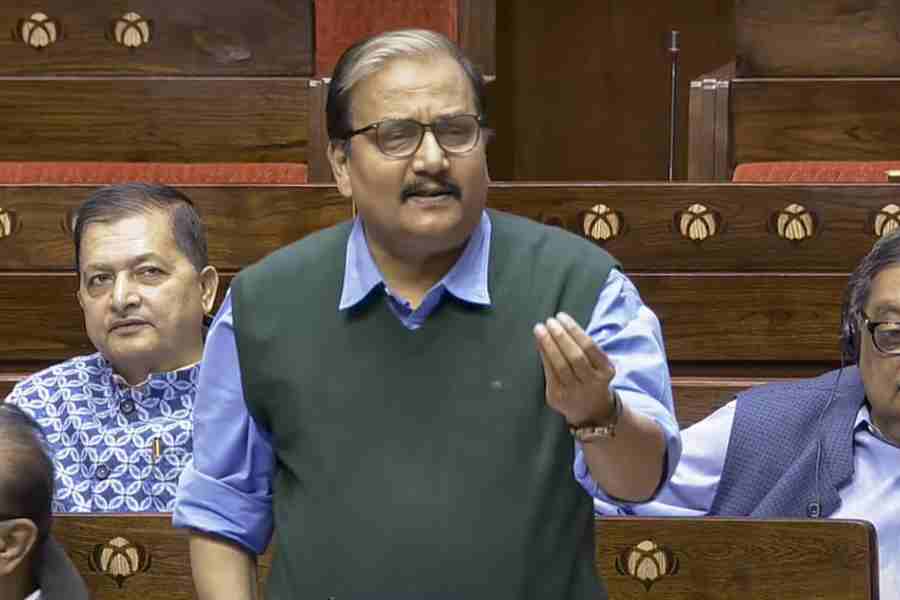Does media coverage of a significant debate in Parliament do the country a disservice when it lets the “sound and fury” (as The Hindu put it) eclipse the saner voices, the more measured arguments that were made? The many news stories that suggested that last fortnight’s debate in Parliament was a contentious washout do injustice to those who spoke eloquently on where the country stands at this point. Thanks to Sansad TV’s footage and YouTube and television channels picking up from it, many glimpses were available of the debate that did provide some food for thought even if it sometimes descended into chaos.
Glimpses from the Lok Sabha and the Rajya Sabha showed many empty seats, and not sufficiently enthused faces among those present. Yet quite a few members of both Houses who presided over the sessions allowed speakers to have their say even as they tried to restrain opposition baying. Kiran Choudhry, the Bharatiya Janata Party member of the Rajya Sabha, went to some length to shield Mukul Wasnik of the Congress from interruptions, asserting repeatedly that it was his maiden speech, “please let him speak”. That is until Wasnik took off on how the Rashtriya Swayamsevak Sangh had no women members and had to be repeatedly reminded to speak on the Constitution.
You could argue, as Suhas Palshikar did in The Indian Express, that overall the debate in each House was short on introspection and long on finger-pointing aggression. (In the case of Shrikant Shinde of the Shiv Sena, literally so, as he confronted Rahul Gandhi with Indira Gandhi’s letter written in 1980 calling Vinayak Damodar Savarkar a remarkable son of India.)
Nor did the BJP ministers who opened the debate in each House, Rajnath Singh and Nirmala Sitharaman, choose to rise above being oppositional first.
But there were others, notably Manoj Kumar Jha (picture) of the Rashtriya Janata Dal, who made thoughtful, occasionally impassioned, interventions. Jha began with an impassioned plea not to villainise Nehru. “If I had a time machine I would take you all to 1946-47 when rivers of blood were flowing and carcasses of pigs were being thrown inside mosques. When we deride our leaders we forget what the state of the country was in, in 1947. Why do you villainise him, don’t make him a villain. You are building higher floors on the foundation Nehru laid. You can build a second floor but without a foundation it is of little use.” He said that the Uniform Civil Code the government wanted to bring was provided for in Article 44, which many are agreed is needed. “But on the way to Article 44 is Article 39C of the Constitution which tackles the concentration of wealth. Stop and think about 39C. Income inequality is a time bomb we are sitting on. And it is impacting all, the poor and the middle class”. We have profit-making companies, he said, but data just out shows that their profit is not reflected in the salaries of their employees. “Relative deprivation ka janm ho raha hai (We are seeing relative deprivation).” Then he spoke of sewer deaths. “Who are theywho die in our sewers? They don’t come in the category of ek hai toh safe hai.”
Kapil Sibal made a sober intervention in the Rajya Sabha, asking “Has the Constitution failed us or have we failed the Constitution?” Have we been able to deliver social justice in this country, he asked, going into the statistics on wealth inequality as well as digital inequality. Two hundred and fifty gram panchayats had to have fibre cable laid, but that has not happened. Sibal went on to talk of videos of Dalits being lynched, the civil war in a part of the country, and thedecline of institutions. “I wishthere was White Paper on the functioning of the Election Commission,” he said.
R. Rajagopal of this paper has brought attention to the speech of the Congress Lok Sabha member, Mohammad Jawed, representing Kishanganj in Bihar, describing vividly the current plight of Muslims in this country. Several parliamentarians spoke eloquently, it is just that the media focused largely on the exchange of barbs, and the ruckus.
Sanjay Singh of the Aam Aadmi Party cited figures on the number of children in the country who have left government schools — 11 lakh, out of which over seven lakh were from Uttar Pradesh alone. When he launched into the achievements of the Delhi government, he was asked by the deputy chairman, Hari Vansh, to speak on the subject of the debate. A. Raja, in his rebuttal of Rajnath Singh’s speech, asked what the contribution of the RSS was to the Constitution. He spoke of the Constitution, constitutionality, and constitutionalism, and his own perusal of the voluminous judgment in the Kesavananda Bharati case.
Abhishek Manu Singhvi of the Congress used the platform to take a swipe at the media, calling it “a remarkable cocktail of overambitious anchors and media owners, with pre-selected pre-curated and pre-committed participants.” But TV channels are only interested in seeking eyeballs for their own survival. India Today TV described the debate on 75 years of the Constitution as a showdown over the Samvidhan. “Govt vs opposition who won the day?” The channel spliced the speeches of Rajnath Singh and Priyanka Gandhi Vadra to make its showdown point.
Mahua Moitra of the Trinamool Congress and Manoj Jha both spoke of India having become a country where your last name matters. “Whether you get your freedom depends on what your name is.” But these were not the issues that journalists and editors chose to headline.
Sevanti Ninan is a media commentator. She also publishes the labour newsletter, Worker Web; https://workerweb.curated.co/issues










